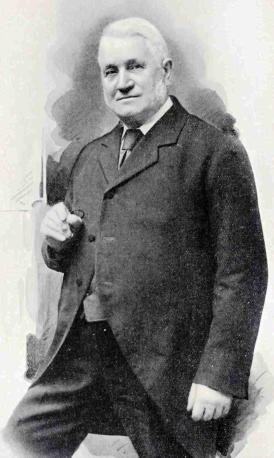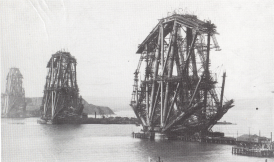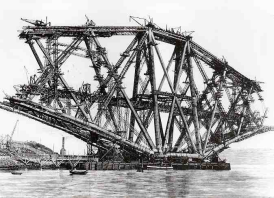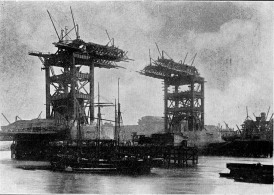William Arrol
1839 – 1913

Sir William Arrol, engineering entrepreneur, steel bridge builder, designer and manufacturer of cranes, heavy machinery and automobiles, innovator in construction methods
Engineering Achievements
Sir William Arrol was a contractor responsible for the fabrication and construction of steel bridges many of which were at the forefront of technology. He developed methods of working and techniques which are still used today. After the collapse of the First Tay Bridge, the major bridges of the time in the United Kingdom, the Second Tay, Forth and Tower Bridges, were entrusted to him and his company. Achieving ingenuity in bridge construction required the development of specialist equipment for the manufacture and erection of steel components, for example the hydraulic riveters and cranes. This led to the development and production of machine tools and material handling devices.
His firm designed and developed a form of engineering workshop that provided clear working space with overhead crane capacity. These were extensively adopted by the heavy engineering and shipbuilding industries in the Glasgow area and further afield. Sir William Arrol saw the potential of the early automobiles and helped finance the Arrol-Johnston business in its formative years.
His Life
-
1839 Born 13 February in Houston, Renfrewshire, Scotland
-
1848 Age: 9 Started work as a 'thread boy' in a Johnstone cotton mill
-
1851 Age: 12 Making bobbins in the turning-shop of Coats Thread Manufacturing Co.
-
1853 Age: 14 Apprenticed to Thomas Reid, blacksmith in Paisley
-
1857 Age: 18 Journeyman Blacksmith in England and Scotland
-
1863 Age: 24 Foreman in Laidlaw & Sons' boiler and bridge yard, Glasgow
-
1864 Age: 25 married Elizabeth Pattison on 15th July
-
1866 Age: 27 Supervised construction of Brighton West Pier ironwork
-
1868 Age: 29 Started a boiler-making business in Peel Street, Glasgow with £85 capital
-
1871 Age: 32 Established Dalmarnock iron works
-
1875 Age: 36 Secured contract for Bothwell Viaduct over the River Clyde
-
1876 Age: 37 Secured contract for Caledonian Railway Bridge over River Clyde in Glasgow
-
1882 Age: 43 Secured contract for Reconstruction of Railway Bridge over River Tay
-
1882 Age: 44 Secured contract for the Forth Bridge
-
1886 Age: 47 Secured contract for Tower Bridge over River Thames in London
-
1889 Age: 50 Awarded Freedom of City of Dundee
-
1890 Age: 51 Knighted
-
1890 Age: 51 Awarded Doctorate of Laws by University of Glasgow
-
1890 Age: 51 Awarded Freedom of Royal Burgh of Ayr on 26 February
-
1895 Age: 56 Elected Liberal Unionist Member of Parliament for South Ayrshire
-
1895 Age: 56 President of the Institution of Engineers and Shipbuilders in Scotland
-
1895 Age: 56 Chairman and financial backer of Mo-Car Syndicate Limited which became Arrol-Johnston
-
1902 Age: 63 Sir William Arrol & Co built engine and boiler shops for Beardmore's Dalmuir Yard
-
1904 Age: 65 Sir William Arrol & Co built bridge over River Nile in Cairo
-
1905 Age: 66 Married Janet Hodgart, a cousin
-
1908 Age: 69 Sir William Arrol & Co built the Arrol gantry at Harland and Wolf, Belfast for Titanic and Olympic
-
1910 Age: 71 Married Elsie Robertson
-
1913 Age: 74 Died 20 February at Seafield, Ayr, Scotland
-
1913 Age: 74 Buried at Woodside Cemetery, Paisley, Renfrewshire, Scotland
His Legacy
The legacy of Sir William Arrol can be seen in the many bridges, cranes and engineering workshops that are still in existence with many still in use: in particular the Forth Bridge, Tower Bridge and Tay Bridge. Sir William created a company which continued, long after his death, to produce and construct "Arrol built" bridges, buildings and cranes that were exported worldwide.
Some surviving examples of his work have become world icons of engineering. The Forth Bridge is a UNESCO World Heritage Site and The Forth Bridge and Clydebank's Titan crane are classed as International Civil Engineering Landmarks by the American Societies of Civil and Mechanical Engineers.
More Information
Bridges, with description of their manufacturing works Sir William Arrol Ltd, 1909
Bridges, Structural Steel Work, and Mechanical Engineering Productions partly reprinted from Engineering. London. 1909
Sir William Arrol, a Memoir Sir Robert Purvis, 1913.
Sir William Arrol, the Great Scottish Bridge Builder John Arrol, 1996.
Bridges, Structural Steelwork Sir William Arrol & Co, 1909.
The Forth Bridge W Westhofen, 1890.
Battle for the North Charles McKean, 2006.
Archives Royal Commission on the Ancient and Historical Monuments of Scotland
Archives Glasgow City Archives
There are two portraits of Sir William Arrol held in the National Portrait Gallery.
Oxford Dictionary of National Biography entry (full text available to subscribers and UK library members)
-

Sir William Arrol
-

Forth Bridge under construction
-

Forth Bridge cantilever under construction
-

Hydraulic Rivetter schematic
-

Tower Bridge under construction
-

Gravestone in Woodside Cemetery, Paisley commemorating Sir William Arrol and his first two wives, Elizabeth Pattison and Jessie Hodgart

